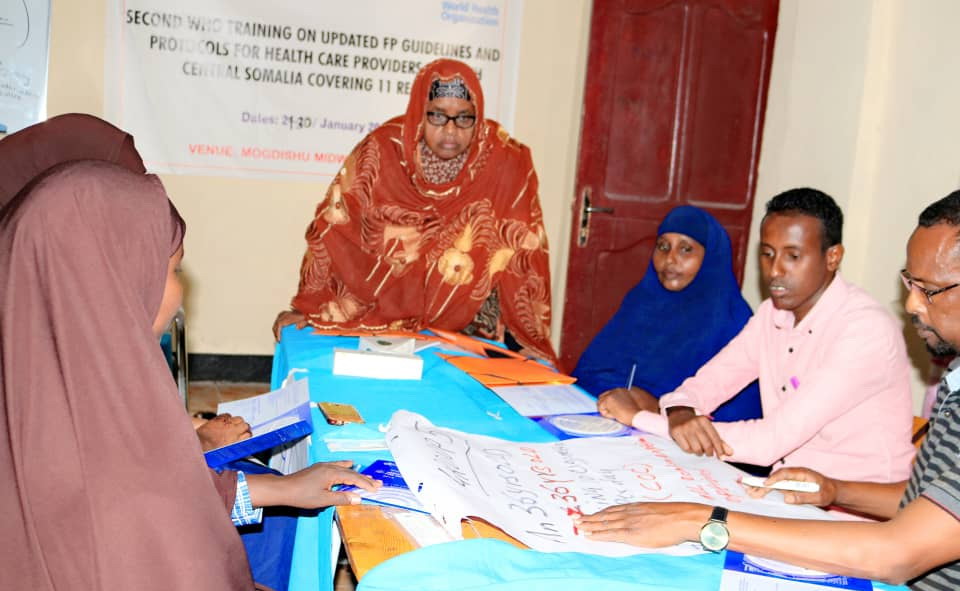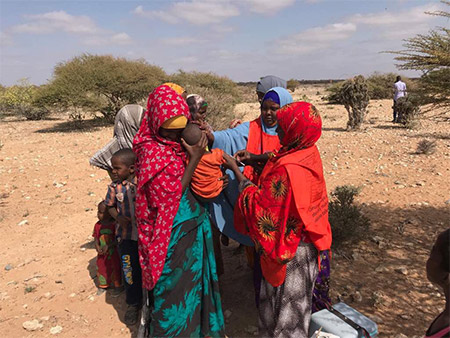Driving change for Somali mothers and children
 11 March 2019 – In most parts of the world, women announce a pregnancy with excitement; they can count on quality and timely support when delivering a child. In Somalia, excitement is often lined with unease, as women are cognizant of the risks associated with pregnancy and delivery.
11 March 2019 – In most parts of the world, women announce a pregnancy with excitement; they can count on quality and timely support when delivering a child. In Somalia, excitement is often lined with unease, as women are cognizant of the risks associated with pregnancy and delivery.
Inadequate health facilities, particularly in remote, rural areas, force women to deliver babies at home. Birth attendants are not always qualified; traditional birth attendants, who are used often, lack technical skills and may even be forced to use contaminated equipment at times. In many instances, expectant mothers simply cannot afford to visit health facilities.
In a country where women often have multiple children with little time between each pregnancy, the lack of infrastructure, including roads and ambulatory services, further exacerbated by insecurity, increases the chances of mothers and their newborns losing their lives, or women experiencing complications during childbirth.
Cultural beliefs passed down over generations result in mothers having no say in providing consent for caesarean section during deliveries, should they require this support. Birth spacing is also a culturally sensitive topic to broach, leaving many women with no time to recover before they conceive their next child. A common practice in Somalia, female genital mutilation, causes obstructed labour. One out of every 12 Somali women dies due to causes related to pregnancy.
Changing the status quo
Halima Abdi Sheikh, better known as Mama Halima Abdi Sheikh, is a pioneer in maternal health services in Somalia. She has dedicated herself to improving the health of mothers, newborns and children – one delivery at a time. Serving WHO in Somalia as Maternal Newborn Child and Adolescent Health Officer for South Central Somalia since 1995, Mama Halima is a true advocate for women’s health. She is also a senior midwife, an educator and a leader. She works to share her passion to improve maternal and child health with Somalia’s next generation of health workers. Being one of the key founders of the Somali Midwifery Association, established in 2012, Mama Halima succeeded in bringing Somalia’s midwives together to speak with one voice and with one platform to represent them nationally. The association’s main aim is to provide quality and timely health care for newborns and mothers.
“Mothers in Somalia trust us. WHO provides medical supplies to treat mothers in health facilities. We are training health workers to upgrade their knowledge and skills so they can deliver babies professionally, and attend to mothers and children in a timely manner,” says Mama Halima, squaring her shoulders proudly. “WHO tools and guidelines are used to support the Government to ensure that Somalia’s maternal and child health services will meet international standards.
Hoping to leave a better legacy
“We have a long way to go, but we can do it,” says a hopeful Mama Halima. “All we need is support and for everyone to remember that they have a role to play.” She explains that Somali authorities and their international and national partners should prioritize the establishment of additional health centres and ambulances, each equipped with modern tools and trained staff. By increasing remuneration for health care providers, authorities can encourage the workforce to provide better services. Regulating legal frameworks on midwifery and maternal health systems would strengthen overall health service delivery. There is also an urgent need to develop the capacity of midwives and health workers by providing on-the-job training, introducing modern training centres and improving the quality of health education offered in Somalia.
When asked what changes she would like to see in the society towards women, Mama Halima ponders for a while, before saying, “I would love to see men change their attitudes, and prioritize and learn about the importance of women’s health. I would also love to see religious leaders empower women by airing their voices. If they can encourage birth spacing and advocate for better health for women and children, they would be leaving the best legacy for the next generation. Women really should receive quality health services. After all, women are raising the next generation of leaders.
Somalia developing comprehensive plan to improve health of mothers, children and adolescents
 WHO and partners support development of Somali reproductive, maternal, neonatal, child and adolescent health strategyMogadishu, 24 January 2019 - With support from the World Health Organization (WHO) and other United Nations partners, Somalia is currently developing a strategy that will change the rhetoric in the country and ensure Somali mothers and children can access quality health services equitably all across urban, rural areas in the country. Known as the “Reproductive, maternal, neonatal, child and adolescent health strategic plan” for Somalia, it focuses on using universal health coverage – a concept that ensures health is equitably delivered to all, without beneficiaries suffering financial hardships while accessing health – as a key tool to availing lifesaving health services to Somalis in urban and rural areas, as well as those with nomadic lifestyles.
WHO and partners support development of Somali reproductive, maternal, neonatal, child and adolescent health strategyMogadishu, 24 January 2019 - With support from the World Health Organization (WHO) and other United Nations partners, Somalia is currently developing a strategy that will change the rhetoric in the country and ensure Somali mothers and children can access quality health services equitably all across urban, rural areas in the country. Known as the “Reproductive, maternal, neonatal, child and adolescent health strategic plan” for Somalia, it focuses on using universal health coverage – a concept that ensures health is equitably delivered to all, without beneficiaries suffering financial hardships while accessing health – as a key tool to availing lifesaving health services to Somalis in urban and rural areas, as well as those with nomadic lifestyles.
Somali mothers and children have been enduring limited access to some of the most basic health services for decades. This has translated in scores of families losing their loved ones to preventable diseases every year. One out of every 12 women dies due to pregnancy-related causes, mostly due to ineffective antenatal care, child deliveries conducted in the absence of skilled birth attendants, late management of complications, such as bleeding, and difficulty in accessing health facilities, particularly for rural populations.
Statistics for children are just as disturbing, with one out of every 7 Somali children dying before seeing their fifth birthday. Leading causes of infant and child mortality are pneumonia, diarrhoea, measles and neonatal disorders.
At a consultative meeting in Mogadishu last week, where partners discussed this critical strategic plan, the Somali Federal Government Minister of Health HE Dr Fawziya Abikar Nur emphasized the importance of health and other key partners in rolling out activities outlined in the plan.
“This groundbreaking strategy will make much-needed contributions in reducing
reproductive, maternal, newborn and child mortality and morbidity in Somalia,” said Dr Ghulam Popal, the WHO Somalia Country Representative. “One key element, for example, will be training for health staff, in areas such as lifesaving resuscitation of newborns, and to deliver children professionally.”
Basic and comprehensive lifesaving services that will be offered through the strategy include safe blood transfusions and caesarean section deliveries for women delivering babies at both community and health facility levels. The strategy will also promote continued care across pregnancy and early childhood, as well as the effective referral during pregnancy and childbirth. Care for newborns will entail the provision of medical supplies and equipment; and monitoring of the low birth weight of pre-term infants. The use of integrated management of childhood illnesses (IMCI) – an integrated and holistic approach to child health that focuses on the wellbeing of the child – will promote comprehensive childcare, using new developments and protocol.


